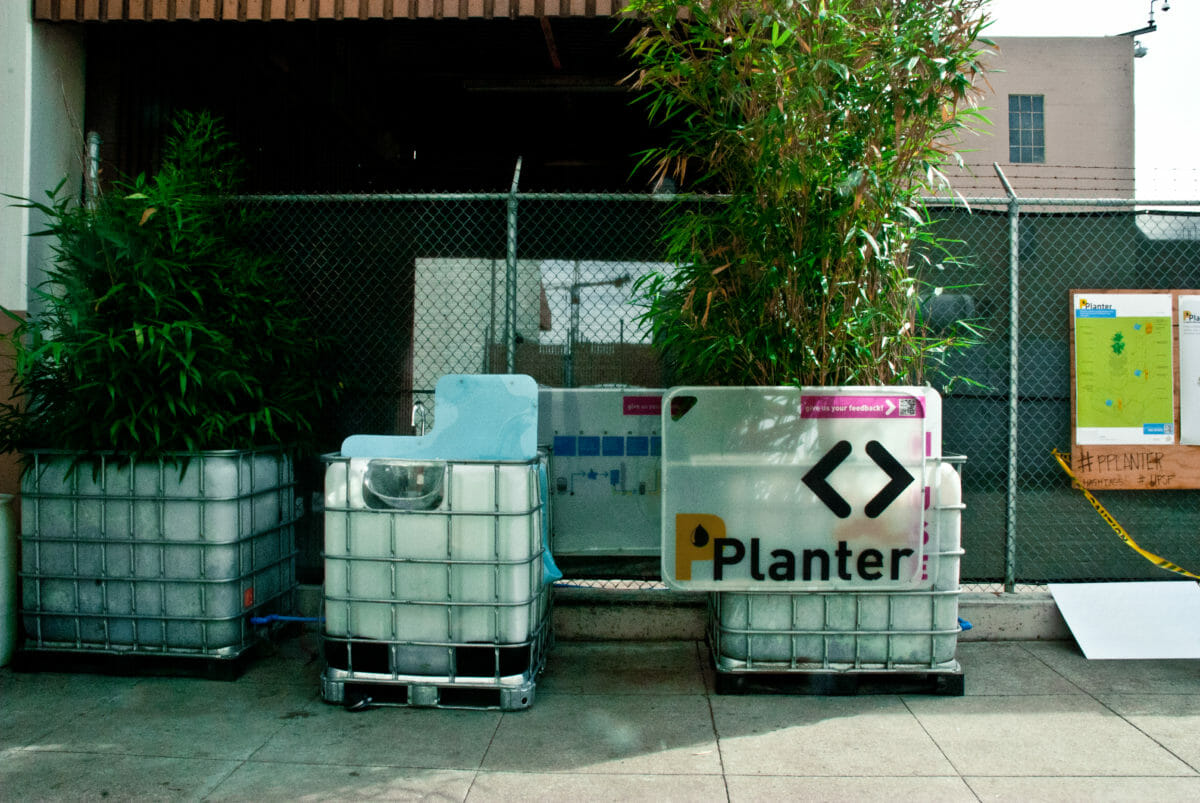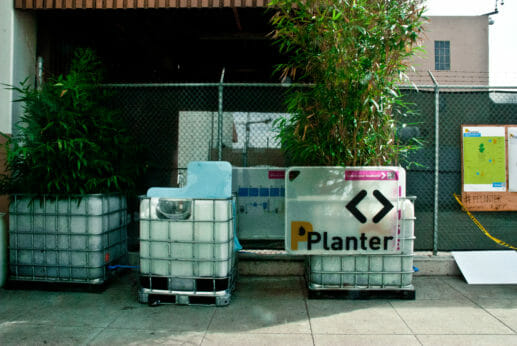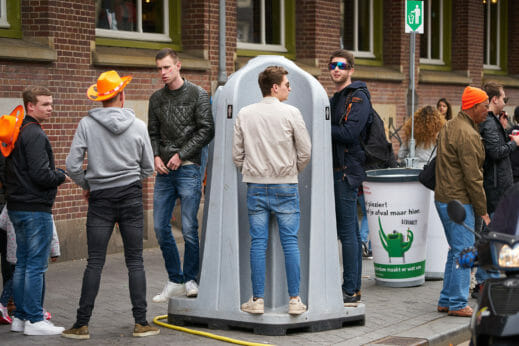A New Weapon in the Battle Against Public Urination: The Pee Planter
Composting toilets are great for the soil, but could they also help put an end to public urination?
A New Weapon in the Battle Against Public Urination: The Pee Planter
Composting toilets are great for the soil, but could they also help put an end to public urination?

We’ve taken a deep dive into the subject of humanure, and have discussed the merits of mass-scale urine collection for use as liquid fertilizer (it’s high in nitrogen, phosphorus, and potassium – three of the most important plant nutrients). We’ve even investigated the potential for turning urine into beer. Which is why we were pleased to discover a new movement on the toilet-to-farm front: public urinals that collect pee and return the nutrients to the soil.
In our opinion, that alone is a good enough reason to install more public urinals, but the municipalities working on this have another angle in mind, as well. It’s not just male dogs that like to pee on telephone poles and fire hydrants – male humans are prone to similar behavior. Streetside urination is such an epidemic in some cities that simply installing port-a-potties in crowded public places hasn’t solved the problem. The composting pee planters and other such urinals below will hopefully have more of an allure for drunken dudes who just need to let it rip.
The Toilet: Uritroittoir
The City: Paris
Parisians have a name for those who violate city bylaws by urinating wherever they feel like it: les pipis sauvages. The city has tried everything to stanch the epidemic, including an “incivility brigade” of 1,900 officers whose sole job is to write tickets for rude behavior in the street, whether littering or peeing. According to the New York Times, this wasn’t enough, leaving plenty of work for the “sanitation brigade,” which is in charge of hosing down and scrubbing the city’s 1,800 miles of sidewalks, in an effort to keep the smell down.
So the Paris municipal government has turned to Faltazzi, an industrial design firm, and begun installing its Uritorittoir toilets at some of the most pee-drenched locations in the city. (“Uritorittoir” is a mashup of the French words for urinal and pavement.) With its sleek modernist design and a bed of flowers on top, it’s as much a PSA for responsible urination as it is a practical option for men who can’t hold it. Apparently, privacy was not a concern of the designers, as there are no walls (obviously it’s not a concern of the target users, either).
The basin at the bottom is full of straw to absorb the urine and control odor. A built-in sensor determines when the unit is full and pings a city worker to come empty it. Then the wet straw is amassed in giant compost piles before being returned as a soil amendment in city parks. The firm also offers a less expensive option – L’Uritinnoir, which is essentially a funnel stuck into a strawbale – as an eco-friendly port-a-pottie for outdoor music festivals or farm parties. They retail for 20 euros each.
The Toilet: PPLanter
The City: San Francisco

The Hyphae Design Laboratory created this composting urinal, which was recently piloted in San Francisco’s Tenderloin district. Unlike the French model, it also includes a sink: after going pee, you press a foot pedal which siphons water out of an adjacent tank to wash your hands. The hand-washing water then flows into the urinal to “flush” it into a second tank, which is filled with special bio-filtration medium and planted with bamboo.
Unlike the Uritroittoir, the PPlanter comes with disposable funnels that adapt the urinal for use by women – the design offers slightly more privacy than the Paris model via a waist level partition that conceals your private parts.
The Toilet: Waternet
The City: Amsterdam

Apparently, any city liberal enough to install eco-urinals is also liberal enough to not expect people to want much privacy while they pee. The city of Amsterdam is a prime example. These plein air potties, installed by Waternet, the local sewage utility, are tied to a system that extracts the phosphorus and turns it into fertilizer for sale to local farms.
And city leaders have even grander plans in the works: adapting the technology to municipal sewage treatment plant to convert urine to fertilizer on a large scale. Authorities estimate that the citizens of Amsterdam produce enough pee to fertilize 10,000 football fields worth of cropland.
Follow us
This work is licensed under a Creative Commons Attribution-NoDerivatives 4.0 International License.
Want to republish a Modern Farmer story?
We are happy for Modern Farmer stories to be shared, and encourage you to republish our articles for your audience. When doing so, we ask that you follow these guidelines:
Please credit us and our writers
For the author byline, please use “Author Name, Modern Farmer.” At the top of our stories, if on the web, please include this text and link: “This story was originally published by Modern Farmer.”
Please make sure to include a link back to either our home page or the article URL.
At the bottom of the story, please include the following text:
“Modern Farmer is a nonprofit initiative dedicated to raising awareness and catalyzing action at the intersection of food, agriculture, and society. Read more at <link>Modern Farmer</link>.”
Use our widget
We’d like to be able to track our stories, so we ask that if you republish our content, you do so using our widget (located on the left hand side of the article). The HTML code has a built-in tracker that tells us the data and domain where the story was published, as well as view counts.
Check the image requirements
It’s your responsibility to confirm you're licensed to republish images in our articles. Some images, such as those from commercial providers, don't allow their images to be republished without permission or payment. Copyright terms are generally listed in the image caption and attribution. You are welcome to omit our images or substitute with your own. Charts and interactive graphics follow the same rules.
Don’t change too much. Or, ask us first.
Articles must be republished in their entirety. It’s okay to change references to time (“today” to “yesterday”) or location (“Iowa City, IA” to “here”). But please keep everything else the same.
If you feel strongly that a more material edit needs to be made, get in touch with us at [email protected]. We’re happy to discuss it with the original author, but we must have prior approval for changes before publication.
Special cases
Extracts. You may run the first few lines or paragraphs of the article and then say: “Read the full article at Modern Farmer” with a link back to the original article.
Quotes. You may quote authors provided you include a link back to the article URL.
Translations. These require writer approval. To inquire about translation of a Modern Farmer article, contact us at [email protected]
Signed consent / copyright release forms. These are not required, provided you are following these guidelines.
Print. Articles can be republished in print under these same rules, with the exception that you do not need to include the links.
Tag us
When sharing the story on social media, please tag us using the following: - Twitter (@ModFarm) - Facebook (@ModernFarmerMedia) - Instagram (@modfarm)
Use our content respectfully
Modern Farmer is a nonprofit and as such we share our content for free and in good faith in order to reach new audiences. Respectfully,
No selling ads against our stories. It’s okay to put our stories on pages with ads.
Don’t republish our material wholesale, or automatically; you need to select stories to be republished individually.
You have no rights to sell, license, syndicate, or otherwise represent yourself as the authorized owner of our material to any third parties. This means that you cannot actively publish or submit our work for syndication to third party platforms or apps like Apple News or Google News. We understand that publishers cannot fully control when certain third parties automatically summarize or crawl content from publishers’ own sites.
Keep in touch
We want to hear from you if you love Modern Farmer content, have a collaboration idea, or anything else to share. As a nonprofit outlet, we work in service of our community and are always open to comments, feedback, and ideas. Contact us at [email protected].by Brian Barth, Modern Farmer
July 17, 2018
Modern Farmer Weekly
Solutions Hub
Innovations, ideas and inspiration. Actionable solutions for a resilient food system.
ExploreShare With Us
We want to hear from Modern Farmer readers who have thoughtful commentary, actionable solutions, or helpful ideas to share.
SubmitNecessary cookies are absolutely essential for the website to function properly. This category only includes cookies that ensures basic functionalities and security features of the website. These cookies do not store any personal information.
Any cookies that may not be particularly necessary for the website to function and are used specifically to collect user personal data via analytics, ads, other embedded contents are termed as non-necessary cookies.